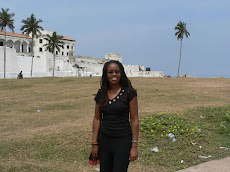

I spent the past week up north in a (relatively) small Ovambo village named Omungwelume. We all stayed at Eengedjo Senior Secondary, a hostel school, and taught school-aged youth in the surrounding community as part of our practice teaching. School hostels are public institutions and students live there in dormitory style housing throughout the school year. Although Namibia’s school-year did not begin until the following week, about 100 children in the village attended two 40-minute classes led by WorldTeach Volunteers each day. Many of the attendees brought their younger (non-school-aged) siblings with them to class.
On my first day of practice teaching, I worked with grade 6 “learners” (Namibia reserves the term, “student” for those in college/university). I taught grade 8 learners on days 2 and 3. During break and after classes, I also led group activities, which were predominantly dance and music-themed. The children quickly fell in love with the soca anthem, “Follow the Leader” and came to my class to request it each day. I proudly obliged. I also taught them the hand/clap game, Concentration (remember, “concentration, concentration is the game, keep the rhythm or you’ll be out the game…”), which was also an instant winner. Finally, I shared a slideshow that included selected pictures of my family, friends, hobbies, and travels. The children who saw the presentation were very attentive and interested.
I was glad to see the diversity of the children, in terms of personal goals and academic knowledge. The learners helped combat some of the spoken and oft-implied stereotypes of youth in a developing country. I often get concerned that the program is not doing a good enough job sharing the successes and diversity of Namibian teachers and students. Our volunteer project is a great resource and support; but, it must be clear that Namibia’s citizens have done well before us and will do well after our short/temporary stay here. (More on that in a later post, remember “Give a man a fish….”) . A Namibian teacher in our first week of training eloquently and humbly noted that Namibia has qualified teachers; the shortfall is in getting qualified teachers to work in rural, more desolate areas (sound familiar?). He also noted that there is a shortage of qualified teachers in selected hard-to-fill subject areas, like mathematics and science (sound familiar again?).
Anyway, the hostel accommodations at Eengedjo. Wow. Okay. I had five roommates (one down from my housing situation in Windhoek, “Woohooo!”), two with whom I worked with as partner teachers. The bathroom was rather malodorous, with one (out of four) working toilet and one (out of five) working shower and we lost water on our final night, which wasn’t all that fun because it was HOT, and each of us were in clear need of a soap and water-based cleanse. Luckily, I had baby wipes. We shared the school grounds with dozens of cattle, donkeys, jynormous(I know that’s not a word) dung beetles, and a few stray dogs and cats(mean cats), oh, and plenty of hungry mosquitoes. I slept under TWO mosquito nets and still got nicely sampled.
The classrooms were in pretty bad shape, not just littered from break; but, with many broken desks, windows, and chairs. The concrete floors were also a challenge because students respectfully raise their hand and stand to speak causing loud scraping sounds that took some getting used to. I didn’t see any resource areas in the classroom, just a chalkboard; however, a few learners (not enrolled in Eengedjo) reported having computers in their schools.
Leaving was actually a bit touching. As our super-bus rolled out along the gravel roads, children and adults stood outside their homes, came to the side of the vehicles, stopped their plowing and smiled and waved us along their way. I appreciated the experience and look forward to working with more youth and school administrators in the days and months to come.
BTW - I've been having trouble uploading photos to include with this post. I'll keep trying. Stay Tuned.



 I went to the (only) bank (in town) yesterday to exchange currency and to inquire about opening a bank account. When I was asked for my home (local) address, I didn't have a real answer; I simply replied, "next to the purple house." My street doesn't have a name and I'm not sure if my house has an actual number. Throughout Namibia, P.O. Boxes are used, rather than direct mail to homes; however, there are streets with names, just not mine, and probably many others in small towns and villages such as Khorixas.
I went to the (only) bank (in town) yesterday to exchange currency and to inquire about opening a bank account. When I was asked for my home (local) address, I didn't have a real answer; I simply replied, "next to the purple house." My street doesn't have a name and I'm not sure if my house has an actual number. Throughout Namibia, P.O. Boxes are used, rather than direct mail to homes; however, there are streets with names, just not mine, and probably many others in small towns and villages such as Khorixas.













.jpg)